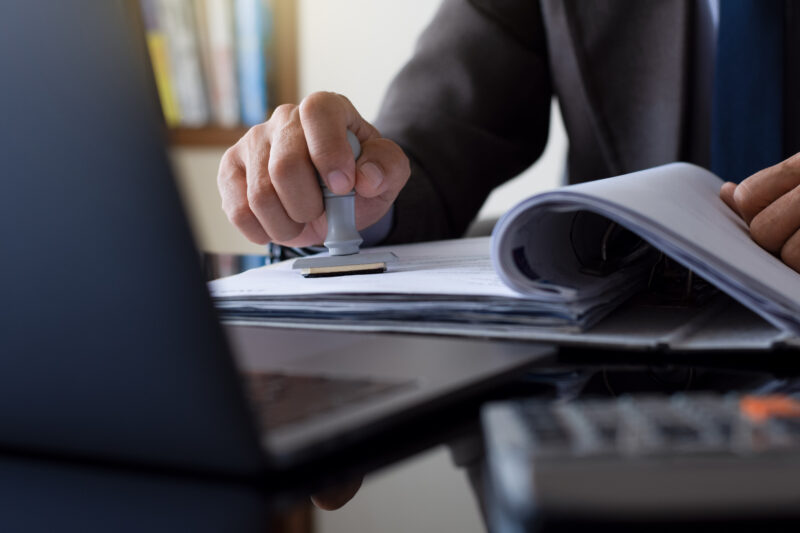A recent study published by university scholars in The Journal of Industrial Economics[1] confirmed how important it is to work with highly qualified professionals to obtain a patent. Indeed, the results of the study confirmed that a higher-quality patent attorney firm can significantly raise the probability of a patent grant.
For their study, the authors considered 106,453 patent applications filed in at least three of five main patent offices, that is, the European Patent Office (EPO), Japanese Patent Office (JPO), Korean Intellectual Property Office (KIPO), National Intellectual Property Administration of China (CNIPA, formerly SIPO) and United States Patent and Trademark Office (USPTO).
The results reveal that attorneys have a significant effect at all offices on the probability of granting of the patent. The effect is even more pronounced at the USPTO where attorney quality is more important than invention quality in the likelihood of obtaining a patent.
The impact of attorney quality on the probability of patent grant was found to be statistically significant in the fields of Information and Communications Technology (ICT), Software, Chemical/Pharmaceutical and Biotechnology. No effect was seen in the Electrical and Instrument fields.
These results are not surprising to us considering that new inventions are generally complex and that the patenting process is a highly technical matter. For instance, the authors point out that the current manual of patent examining procedure is 4135 pages long in the United States, and 969 pages long in Europe.
In conclusion, as reported by the authors, the study clearly shows that “the choice of patent attorney firm has a strong effect on the probability of grant”[2] . Furthermore, the study mentions that the benefits of high-quality patent attorneys are likely to extend well beyond grant since “high-quality attorneys are also more likely to write solid patent claims that will stand up if tested in a court of law”[3]. In a nutshell, for their own benefit, patent applicants should make sure to entrust their inventions only to qualified patent professionals from reputable firms.
[1] Gaétan De Rassenfosse, Paul H. Jensen, T’mir Julius, Alfons Palangkaraya, and Elizabeth Webster: “Is the patent system an even playing field? The effect of patent attorney firms”, The Journal of Industrial Economics, Vol. LXXI, March 2023, No. 1, p. 124-142.
[2] Ibid, page 137
[3] Ibid, page 137
Une étude confirme l’importance de faire appel à des cabinets d’avocats spécialisés en brevets et hautement qualifiés
Une étude récente publiée par des universitaires dans The Journal of Industrial Economics[1] a confirmé l’importance de travailler avec des professionnels hautement qualifiés pour obtenir un brevet. En effet, les résultats de l’étude ont confirmé que le recours à un cabinet d’avocats de haut niveau spécialisé en brevets peut augmenter de manière importante les chances d’obtenir un brevet.
Pour cette étude, les auteurs ont pris en compte 106 453 demandes de brevet déposées dans au moins trois des cinq principaux bureaux des brevets, à savoir l’Office européen des brevets (« OEB »), l’Office des brevets du Japon (« JPO »), l’Office de la propriété intellectuelle de Corée (« KIPO »), l’Administration nationale de la propriété intellectuelle de la Chine (« CNIPA », anciennement « SIPO ») et l’United States Patent & Trademark Office (« USPTO »).
Les résultats révèlent que les avocats jouent un rôle déterminant dans la probabilité qu’un brevet soit octroyé, et ce, dans tous les bureaux de brevets. L’effet de l’avocat sur la probabilité d’obtention du brevet est encore plus marqué à l’USPTO, qui accorde plus d’importance à la « qualité de l’avocat » qu’à la « qualité de l’invention » lorsqu’on lui demande de se prononcer sur la probabilité qu’un brevet soit octroyé.
D’après les résultats de l’étude, l’effet de l’avocat sur la probabilité que le brevet soit octroyé est statistiquement significatif dans les domaines des technologies de l’information et de la communication (TIC), des logiciels, de la chimie/pharmacie et des biotechnologies. Aucun effet n’a été observé dans les domaines de l’électricité et des instruments.
Ces résultats ne sont pas étonnants dans la mesure où les nouvelles inventions sont généralement complexes et que le processus d’octroi des brevets est hautement technique. Par exemple, les auteurs soulignent que le manuel actuel de procédure d’examen des brevets des États-Unis compte 4 135 pages et que celui utilisé en Europe en compte 969.
En conclusion, comme l’indiquent les auteurs, l’étude montre clairement que [traduction] « le choix du cabinet d’avocats se spécialisant en brevets a une incidence importante sur la probabilité d’octroi du brevet[2] ». De plus, l’étude mentionne que les avantages que peuvent apporter les avocats en brevets hautement qualifiés vont probablement bien au-delà de l’octroi, car [traduction] « les avocats en brevets hautement qualifiés sont également plus susceptibles de rédiger des demandes de brevet solides qui résisteront si elles sont contestées devant un tribunal[3] ». En résumé, pour leur propre bénéfice, les demandeurs de brevets devraient s’assurer de confier leurs inventions qu’à des professionnels des brevets compétents, issus de cabinets réputés.
[1] Gaétan De Rassenfosse, Paul H. Jensen, T’mir Julius, Alfons Palangkaraya et Elizabeth Webster : « Is the patent system an even playing field? The effect of patent attorney firms », The Journal of Industrial Economics, Vol. LXXI, mars 2023, no 1, p. 124-142.
[2] Ibid., page 137.
[3] Ibid., page 137.
Serge Lapointe has extensive experience in patent protection in the life sciences sector in Canada, the United States and abroad. Serge combines his vast knowledge and his experience when drafting patent applications and preparing opinions on the validity and infringement of biotechnology, pharmaceutical and chemical patents. He gets often involved into intellectual property due diligence investigations.
Serge has more than 20 years of experience working in firms and in industry, and he has acquired in-depth knowledge of the scientific and regulatory aspects of drug development. His ability to examine technology from a pragmatic business perspective is an added value for clients.
Serge responds effectively to the legal and commercial needs of a varied clientele from the genomics, proteomics, pharmaceutical products and chemical industries.
He has considerable experience in assisted reproductive technologies, diseases of the central nervous system, obesity, diabetes, virology, microbiology, genetic markers, blood and nephrological disorders, stem cells, nutraceuticals, and green technologies.


